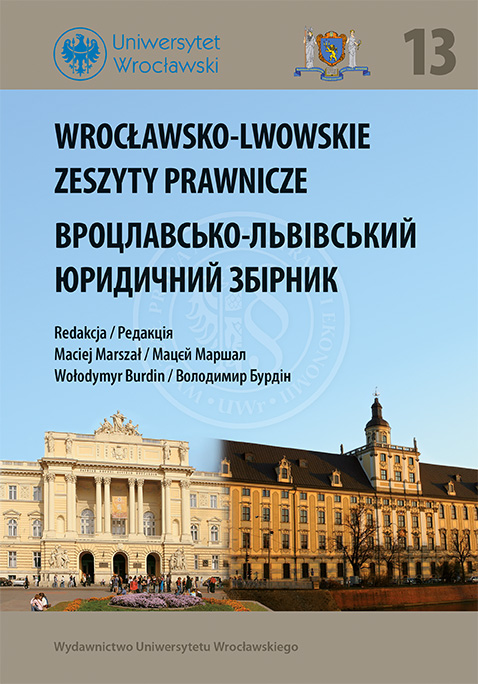

Artykuły

The article is devoted to the development of the study of the history of Western European Law in Lviv from the history of German law to complex comparative studies at the Faculty of Law of Lviv University. The contribution of the employees of the Faculty of Law of Lviv University to the advancement of Western European law is shown. The authors list contemporary researchers at Lviv University who studied Western European law, as well as prominent foreign researchers who have been and are interested in this topic. The peculiarities of scientific and educational works of scientists are studied and their significance and contribution to the development of Western European law at the Faculty of Law of Lviv University are analyzed.
The use of historical experience, based on the example of the Faculty of Law of Lviv University, namely, the formation and development of Western European law as an academic subject, has brought invaluable progress in the study of law. This is because the development of Western European law today will help us better understand the value of the origins of scientific concepts that were formed and are still being formed under the influence of different historical periods, which were initiated by scholars of the Faculty of Law, Lviv University.
The history of Western European law is a complex field, developed actively in Lviv since the early 20th century. Its formation took place on the basis of studies in the history of German law, which were conducted at the University of Lviv in the previous century. Their characterization as a scientific field, as well as through the prism of departments and teachers, was provided in the article “Formation and development of the historical and legal school at the Faculty of Law of Lviv University” by Igor Boyko and Vladimir Kakhnych, as well as in the thorough monograph Legal Education and Science at the University of Lviv (1661–1939) by Kakhnych. These authors characterized the history of German law within, according to their definition, the scientific school of the history of state and law of non-Slavic peoples, arguing that this scientific environment began to take shape at Lviv University, named after Emperor Franz I in the second half of the 1850s. From 1855, the Department of German Law operated at the Faculty of Law, headed first by Ferdinand Bischoff and then by Heinrich Brunner. Among Bischoff’s works, Boyko and Kakhnych highlighted Beiträge zur Geschichte des Magdeburger Rechts (Articles on the History of Magdeburg Law, 1865) and Über des deutschen Rechtskodex der Bibliothek (On the German Legal Code of the Cracow Library, 1865), and among the works of Brunner Die Landschenkungen der Merowinger und Agilolfinger (Grant of Land for Merovingians and Agilolfingers, 1885), Deutsche Rechtsgeschichte (History of German Law, 1887–1892), and Grundzüge der deutschen Rechtsgeschichte (Fundamentals of the History of German Law, 1901).
So, as we see, Brunner went from writing narrow thematic works to syntheses, which required the educational process. Among the next generation of representatives of the scientific school of the history of state and law of non-Slavic peoples, Boyko and Kakhnych emphasized the figure of Edward Bull, who conducted studies on the history of German state and law in 1870–1880, then Alexander Janowicz, Przemyslaw Dombkowski, Alfred Galban. In characterizing these scholars, the authors focused primarily on their biographies. Here we will try to cover their teaching activities in the context of the history of German law and the history of Western European law (based primarily on the official publications of Lviv University, which have the character of primary sources).